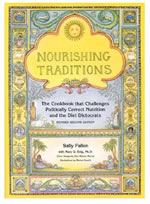Nourishing Traditions
 Nourishing Traditions: The Cookbook that Challenges Politically Correct Nutrition and the Diet Dictocrats is written by Sally Fallon, who is a nutrition researcher and president of the Weston A. Price Foundation.
Nourishing Traditions: The Cookbook that Challenges Politically Correct Nutrition and the Diet Dictocrats is written by Sally Fallon, who is a nutrition researcher and president of the Weston A. Price Foundation.
In this book Fallon asserts that modern food choices and preparation techniques represent a dramatic change from the way that we have nourished ourselves for thousands of years and as a result we are seriously compromising our health.
She proposes the idea that the nourishing culinary traditions of our ancestors are the key to good health and should serve as the model for contemporary eating habits.
Nourishing Traditions Basics
The dietary suggestions made by Fallon are based on the research of Dr Weston Price who studied traditional diets. He observed that when cultures ate their native diets they were free of chronic disease, dental decay and mental illness.
Without exception when they commenced eating a modern processed diet all of the protective effects were lost and their incidence of these conditions were the same as that experienced in the rest of the modern world.
One of the major points highlighted by Nourishing Traditions was that almost all of the traditional diets included seafood, organ meats or dairy products. Animal fat was valued as playing a primary role in supporting good health.
As such, Fallon argues that we actually need animal fats in our diet, which is strongly in contrast with the common advice that a low fat, low cholesterol diet is the best for our health. She supports her statements with scientific research that brings into question the proposed negative effects of saturated fats that are claimed to be the cause of chronic disease by many health authorities.
However, Nourishing Traditions emphasizes that it is of vital importance that animal products are of the highest quality, organic, and free-range. Dairy products also should be raw and unpasteurized. It is also recommended to consume raw eggs, fish and meat on a regular basis.
Fallon highlights the importance of traditional methods of food preparation because they can actually increase the nutrient availability of fruits, vegetables, nuts, grains, meat and dairy products. Techniques such as making bone broths, fermenting vegetables and milk and soaking nuts and grains are utilized in many of the recipes.
Recommended Foods
Fresh fruit and vegetables, organic meat and poultry, fish, eggs, raw dairy products, fermented vegetables, homemade bread, whole grains, legumes, honey, maple syrup, coconut are used in Nourishing Traditions Recipes.
Sample Diet Plan
| Breakfast
Whole grain pancakes with butter, maple syrup and blueberries |
| Morning Snack Fresh peach |
| Lunch
Curried chicken salad on mixed greens |
| Afternoon Snack
Apricot bars |
| Dinner
Beef burritos, guacamole, raw sour cream, salsa |
| Dessert
Carob Cake |
Exercise Recommendations
The book does not include exercise advice.
Costs and Expenses
Nourishing Traditions retails at $25.
Nourishing Traditions Pros
- Encourages the intake of a wide variety of whole foods.
- Discourages the use of refined grains, sugar and artificial sweeteners.
- Offers suggestions for those with limited time or a limited budget.
- Based on scientific research.
- Includes over 700 recipes.
Nourishing Traditions Cons
- Not targeted towards weight loss.
- Diet could easily become too high in sugar and fat if not planned carefully.
- Many of the recipes involve long preparation times.
- Raw animal products carry a risk of bacterial contamination.
- Does not include a meal plan.
- Does not encourage exercise.
Conclusions
Nourishing Traditions questions many of the currently held beliefs regarding nutrition and supports the arguments presented with compelling evidence and scientific research.
Fallon offers many valuable techniques and suggestions to increase the nutritional quality of the diet. However, Nourishing Traditions does not provide adequate guidelines in regard to creating nutritional balance, especially in relation to the treatment of specific health conditions.
-
References:
- Nestle, M. (1999). Animal v. plant foods in human diets and health: is the historical record unequivocal?. Proceedings of the Nutrition Society, 58(02), 211-218. study link
- Cordain, L., Eaton, S. B., Sebastian, A., Mann, N., Lindeberg, S., Watkins, B. A., … & Brand-Miller, J. (2005). Origins and evolution of the Western diet: health implications for the 21st century. The American journal of clinical nutrition, 81(2), 341-354. study link
- Trichopoulou, A., & Lagiou, P. (1997). Healthy traditional Mediterranean diet: an expression of culture, history, and lifestyle. Nutrition reviews, 55(11), 383-389. study link
Comments
Comments now closed